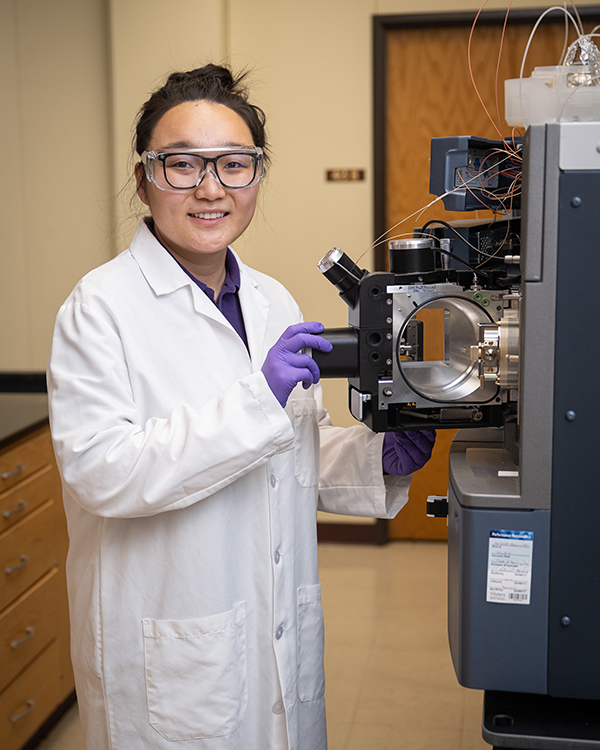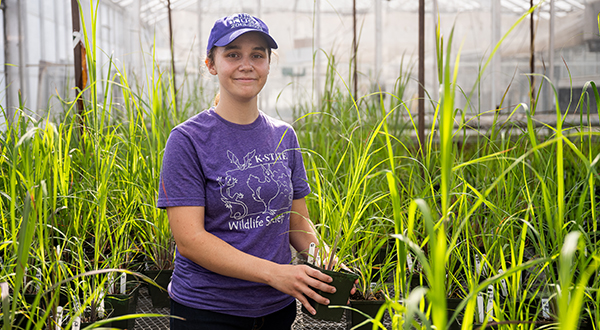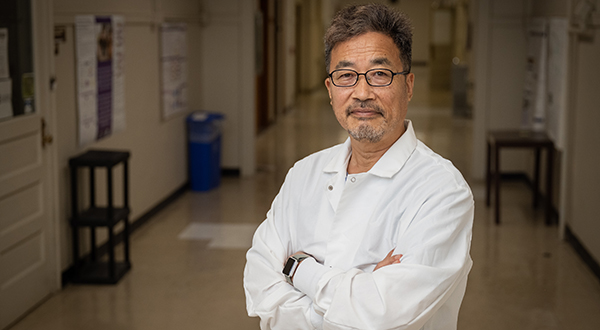Needle in a protein haystack
Graduate student investigates connection between protein degradation and cancer cell reproduction
Doctoral candidate Wei Wu's research suggests a potential target for cancer treatment.
 By Kate Kennedy
By Kate Kennedy
Office of the Vice President for Research
Researchers estimate there are tens of thousands of different proteins in the human body. Determining how and which of these molecules trigger physiological disfunction may seem like searching for a needle in a protein-packed haystack, but one Kansas State University student is up for the challenge.

Wei Wu, a graduate student and doctoral candidate in chemistry, came to K-State from the Chinese province Heilongjiang with her sights set on food science. Along the way, however, she discovered a love for chemistry.
After obtaining her bachelor’s degree in food science and industry in 2019, Wu began graduate research under the guidance of Ping Li, associate professor of chemistry in the College of Arts and Sciences.
Under Li’s leadership, the Protein and Biopolymer Analysis Core Lab aims to understand the relationship between protein methyltransferases — a classification of enzymes crucial to human physiology — and the reproduction of cancerous cells.
“Protein is the biomolecule that directly participates in cellular activities,” Wu said. “The dysfunction of protein, whether too much, too little or too unstable, can disrupt normal cellular activities and potentially lead to cancer.”
Specifically, Wu now investigates the effect of excessive growth of the protein N-terminal transferase 1, or NTMT1.
“Protein NTMT1 is over-expressed in many cancers, and we want to know its effect on cancer cell proliferation,” Wu said. “If the over-expressed NTMT1 promotes cancer cell growth, it could be a potential target for cancer treatment. In our lab, we developed molecules that can enter cancer cells and specifically degrade NTMT1.”
After degrading the proteins, Wu observed proliferation was inhibited in both 2D and 3D cell culturing. She uses a mass spectrometer, a device which measures molecular properties like mass and structure, to analyze the NTMT1-related cellular activities or pathways that resulted in the inhibition.
“I have the opportunity to use various types of mass spectrometry designed for different applications and can also connect with experts across different fields.”
Wu said their research provides significant insight into a world of great unknowns.
“There are more than 25,000 known proteins, but for most of them, the functions and their roles in the cellular activities remain unknown,” Wu said. “In our research, we observed cancer cell proliferation inhibition, suggesting NTMT1 could be a potential target for cancer treatment. Now, we and other groups can focus on NTMT1 and the mechanisms behind it.”
Wu interned with Bayer Crop Science in Missouri during summer 2024. She said her internship allowed her to continue biological molecule research with a focus on protein characterization to support safety assessments and regulatory submissions.
“I have the opportunity to use various types of mass spectrometry designed for different applications and can also connect with experts across different fields,” Wu said.
Wu’s goal after graduating is to stay in the industry, preferably in pharmaceuticals or agriculture. However, she said gene editing and enzyme-directed evolution have piqued her interest, and she hopes to further expand her knowledge in other fields.


